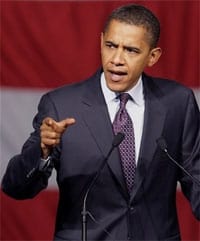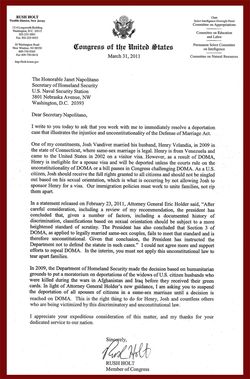Ari Ezra Waldman is a 2002 graduate of Harvard College and a 2005 graduate of Harvard Law School. After practicing in New York for five years and clerking at a federal appellate court in Washington, D.C., Ari is now on the faculty at California Western School of Law in San Diego, California. His research focuses on gay rights and the First Amendment. Ari will be writing weekly posts on law and various LGBT issues.
Follow Ari on Twitter at @ariezrawaldman.
 Henry Velandia may be deported. His capable attorney, Lavi Soloway, has worked tirelessly to prevent that from happening, but recently ran into a brick wall. Mr. Soloway asked the Immigration and Customs Enforcement (ICE) Chief Counsel in the Newark District office to postpone any deportation proceedings until the fate of the Defense of Marriage Act (DOMA) could be decided by Congress or the Supreme Court. The ICE denied the request, saying that because Mr. Velandia's green card would eventually — and definitely — be denied pursuant to DOMA, it would be inappropriate to delay or terminate deportations proceedings. Mr. Soloway calls this the effect of a "Super DOMA" — a bloated law having broad collateral effects that it should not have because the Obama Administration wants to be seen as enforcing DOMA for political reasons.
Henry Velandia may be deported. His capable attorney, Lavi Soloway, has worked tirelessly to prevent that from happening, but recently ran into a brick wall. Mr. Soloway asked the Immigration and Customs Enforcement (ICE) Chief Counsel in the Newark District office to postpone any deportation proceedings until the fate of the Defense of Marriage Act (DOMA) could be decided by Congress or the Supreme Court. The ICE denied the request, saying that because Mr. Velandia's green card would eventually — and definitely — be denied pursuant to DOMA, it would be inappropriate to delay or terminate deportations proceedings. Mr. Soloway calls this the effect of a "Super DOMA" — a bloated law having broad collateral effects that it should not have because the Obama Administration wants to be seen as enforcing DOMA for political reasons.
Mr. Soloway wants the ICE to exercise what is called "prosecutorial discretion" to hold off on processing Mr. Velandia's deportation. After all, DOMA does not require deportation of anyone; the eventual denial of a spousal visa pursuant to DOMA is just one in a slew of factors immigration prosecutors should consider. Mr. Soloway also notes that such discretion is routinely part of immigration law; immigration prosecutors have the power to decide whom to put at the top of the deportation list, whom to process slowly and whom to not process at all based on a litany of factors — humanitarian, political, legal and economic, to name just a few. And, that is precisely what is wrong with immigration law. We like to call ourselves a nation of laws, not of men, a nation where no man is above the law. Yet, when it comes to immigration, we are a nation of men.
Let me be clear, I support Mr. Soloway, his tactics and his goals.
Like any attorney, I would do everything a lawyer could to keep Mr. Velandia and his husband, Josh Vandiver, together. All Mr. Soloway is doing is playing the game according to the rules, does it better than just about anyone else, and I wish him luck. Mr. Soloway and I have spoken at length about his views and this case and we agree on more than we disagree. But, let us be honest about the game we are playing. I object to the fact that such boundless discretion actually exists, for when we let men decide when to enforce a law on a whim, we make a mockery of representative democracy and become a tyranny of men.
Continued, AFTER THE JUMP…
Because Section 3 of DOMA only recognizes a marriage between one man and one women for the purposes of federal law, Mr. Vandiver cannot successfully sponsor his foreign national spouse for a marriage visa. As far as the federal government is concerned, Mr. Velandia's Connecticut marriage to Mr. Vandiver is like decaffeinated coffee — fine if you like that sorta thing, but it really has no effect on you whatsoever. DOMA denies the couple a slew of federal benefits associated with a federally recognized marriage. One of those benefits is the chance to get a visa for a foreign national spouse.
That is the law and no one disputes that. Mr. Velandia's quest for a visa will end in failure as long as the application is processed while DOMA is on the books. But, Mr. Velandia's counsel believes that because his client is neither a criminal nor a terrorist and is an important member of his community and married to a man who cannot move to Venezuela with his deported spouse, immigration officials should stop pursuing Mr. Velandia's deportation — basically, ignore the fact that Mr. Velandia's visa will eventually be denied under DOMA — until Congress repeals DOMA or the Supreme Court overturns it. At that point, the visa could be processed and granted.
So, basically, Mr. Soloway wants the government to stop or delay the eventual application DOMA to Mr. Velandia until DOMA no longer exists. Only a lawyer could see that as something other than a request to stop enforcing DOMA while it's still on the books.
Unfortunately, he would be right.
DOMA no more requires the immediate deportation of Mr. Velandia any more than it requires Anderson Cooper to wear exceedingly tight black t-shirts. In fact, it does not require deportation at all. And to use DOMA as an excuse not to at least delay Mr. Velandia's deportation since he is not a priority case is an example of what Mr. Soloway is calling "Super DOMA" — the law having a greater effect than it should based on the Administration's politically-motivated desire to be seen as complying with its executive duties to enforce duly enacted laws.
 Mr. Soloway is right and wrong. He is right that DOMA is having unnecessary collateral effects, but he misses why in two related ways. First, Mr. Soloway wears two hats: he is an activist and he is a lawyer; he organizes rallies and encourages grass roots involvement through his website, Stop the Deportations, and he represents clients in immigration court. Sometimes, those hats conflict. Out of a desire to gin up grass roots support against an easy target, Mr. Soloway may be too quick to conclude why the Administration is being so aggressive and misses the fact that President Obama knows that enforcing DOMA is not going to win him magical Republican support in Congress or in the polls; rather, it may be the President's deeply held commitment to his executive responsibility that moves him to comply with a law he hates. President Obama, a former constitutional scholar and teacher who came to the presidency through legislative posts, knows the importance of separation of powers, believes in the primacy of a democratically elected legislature and takes seriously his responsibility to execute the laws on the books. As he discussed in his book, Reading Obama: Dreams, Hope and the American Political Tradition, Obama scholar Professor James T. Kloppenberg agrees. President Obama is no fan of an all powerful executive and many of his first term tactics — giving Congress power to write the health care law, seeking legislative repeal of Don't Ask, Don't Tell and so on — prove as much. Cynicism should not always cloud our judgment when all the evidence suggests that President Obama is acting according to his ideals, not political expediency.
Mr. Soloway is right and wrong. He is right that DOMA is having unnecessary collateral effects, but he misses why in two related ways. First, Mr. Soloway wears two hats: he is an activist and he is a lawyer; he organizes rallies and encourages grass roots involvement through his website, Stop the Deportations, and he represents clients in immigration court. Sometimes, those hats conflict. Out of a desire to gin up grass roots support against an easy target, Mr. Soloway may be too quick to conclude why the Administration is being so aggressive and misses the fact that President Obama knows that enforcing DOMA is not going to win him magical Republican support in Congress or in the polls; rather, it may be the President's deeply held commitment to his executive responsibility that moves him to comply with a law he hates. President Obama, a former constitutional scholar and teacher who came to the presidency through legislative posts, knows the importance of separation of powers, believes in the primacy of a democratically elected legislature and takes seriously his responsibility to execute the laws on the books. As he discussed in his book, Reading Obama: Dreams, Hope and the American Political Tradition, Obama scholar Professor James T. Kloppenberg agrees. President Obama is no fan of an all powerful executive and many of his first term tactics — giving Congress power to write the health care law, seeking legislative repeal of Don't Ask, Don't Tell and so on — prove as much. Cynicism should not always cloud our judgment when all the evidence suggests that President Obama is acting according to his ideals, not political expediency.
Second, Mr. Soloway seeks "prosecutorial discretion" without regard for the implications of the fact that such discretion is a common feature of immigration law. And, of course he should: he represents a client who is about to be deported and needs all avenues explored. Mr. Velandia wants his attorney to play the game, but the game stinks. The law may state that a foreign national who is legally married to a same-sex American citizen could never be granted a spousal visa, but immigration law is such that government attorneys are given wide latitude to determine how to process each deportation of someone without a visa. They have an endless list of factors to use to decide whom to move through the system and they do not have to explain why one applicant gets pushed to the end of the line when another gets bumped to the top.
 More than 60 members of Congress, led by Congressman Rush Holt (D-NJ) and Senators Frank Lautenberg (D-NJ) and Robert Menendez (D-NJ), want that discretion applied to save Mr. Velandia. It should. Mr. Velandia fits all the criteria of someone who need not be deported so soon — he has tied to his community, he has no criminal record, he is contributing to society, his spouse cannot move to Venezuela with him. DOMA may be waiting in the wings to deny Mr. Velandia his visa, but the ICE has a plethora of factors to look at to decide whether to deport him.
More than 60 members of Congress, led by Congressman Rush Holt (D-NJ) and Senators Frank Lautenberg (D-NJ) and Robert Menendez (D-NJ), want that discretion applied to save Mr. Velandia. It should. Mr. Velandia fits all the criteria of someone who need not be deported so soon — he has tied to his community, he has no criminal record, he is contributing to society, his spouse cannot move to Venezuela with him. DOMA may be waiting in the wings to deny Mr. Velandia his visa, but the ICE has a plethora of factors to look at to decide whether to deport him.
But, any system of such boundless discretion is troubling. It can be abused, cheated or manipulated. And, it is unfair. If any of the social conservatives seeking the Republican nomination for president gain control of the White House, he could direct the ICE to delay deportations of devout Christians. After all, attachment to one's community through a church is a valid factor to consider when applying "prosecutorial discretion." The process also reminds me of a unique facet of military criminal justice called clemency, in which a commander has the chance to look at it the findings and sentence of a court-martial and cross out or lessen certain punishments simply because the convicted service member is a good guy, won military awards or is essential to his unit's mission, to name just a few of an unspecified list of factors. Some other factors: the commander likes the guy, they used to have drinks together, the defendant didn't mean to, the commander was in a good mood, and so on. Clemency, like prosecutorial discretion in the immigration context, is an example where rules are applied on the whims of men, rather than by the dispassionate dictates of written laws. We give similar discretion to criminal prosecutors and while their wide latitude is also troubling sometimes, it is a topic for another post.
Mr. Soloway responds that this kind of discretion is exactly how the executive branch works. Congress passes a law and the experts at, say, the Environmental Protection Agency or the Labor Department or the Department of Homeland Security write regulations that guide implementation of the intent of Congress. Indeed, he is correct. Republican and Democratic administration have promulgated countless guidelines to make the immigration process work, but what they have done is left almost boundless discretion to these prosecutors.
When we let men rise above the law, we infantilize law and subjugate most of us to the whims of the few.
Again, Mr. Soloway disagrees, stating "exercising discretion is an inherent part of executing/enforcing the law. We want the Executive Branch, whether Democratic or Republican to develop guidelines/policy that are subject to Congressional oversight (and available for all of us to see and understand) and keep us safe. That's why we applaud the emphasis on deporting those who are a threat to our safety and we understand why it made sense in 2009 for the Department of Homeland Security to put a moratorium on deportation of widows. It's not tyranny of men, it's making sure that the laws Congress pass have their intended effect." Well said, but what was Congress's intended effect on passing DOMA? In part, it was to let the federal government discriminate against same-sex couples and deny those couples the federal benefits of marriage. That includes not deporting foreign national spouses of American citizens. Executive regulations are essential to implement vague laws — that is why, for better or for worse, most of President Obama's financial reforms will actually be written by Elizabeth Warren. But, Congess made a point of enshrining anti-gay discrimination into law with DOMA. President Obama may hate the law, but I doubt he thinks it is his job to use executive guidance to flout it.
Still, such is the game we play and in our desire to see a positive result, we should not lose sight of the fact that we want to manipulate a broken and tyrannical system for our benefit. The ICE should exercise its discretion to prevent Mr. Velandia and Mr. Vandiver from being torn apart, and my heart hopes that happens. There is no legitimate reason why two men who have committed to one another should have to be split apart. Yet, if Mr. Velandia's deportation is halted, which i hope it is, it would nevertheless be a victory for the tyranny of men over the rule of law.



